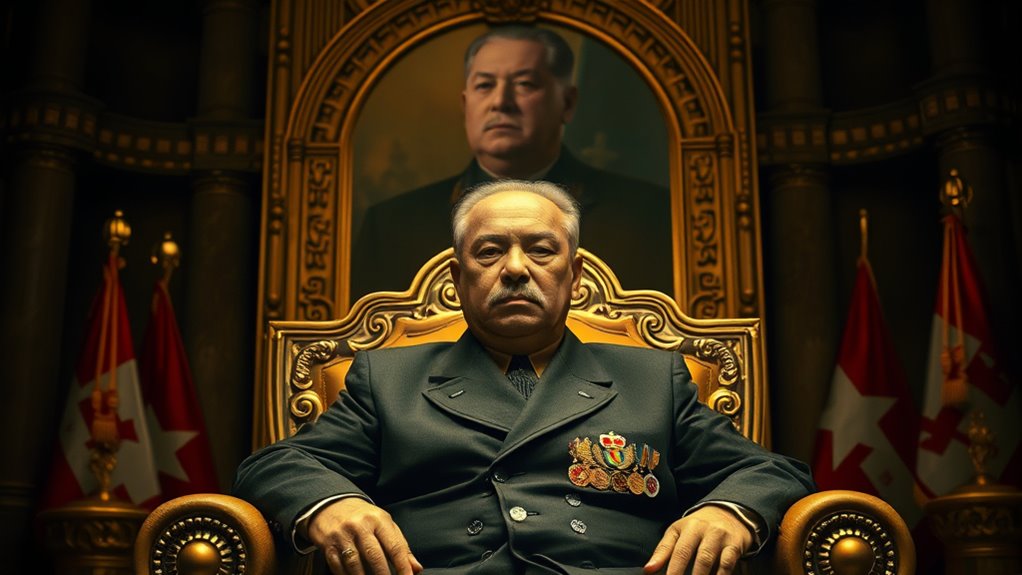Narcissistic traits are common among authoritarian leaders and shape their behavior, governance, and influence on society. These leaders crave admiration, often make risky decisions, and use emotional manipulation to control followers. Their traits foster fear, loyalty, and social division, undermining democratic principles. Understanding these traits helps you see how such leaders use propaganda, oppression, and polarization to maintain power. If you keep exploring, you’ll learn more about how these personalities impact politics and society.
Key Takeaways
- Narcissistic leaders seek admiration, exhibit grandiosity, and often make risky decisions that threaten democratic institutions.
- They use emotional manipulation and propaganda to bolster their legitimacy and control public perception.
- Narcissism aligns with authoritarian traits like hostility toward minorities, suppression of dissent, and emphasis on hierarchy.
- Such leaders increase political polarization by fueling hostility, dehumanizing opponents, and intensifying social divisions.
- Understanding their personality traits can help develop strategies to reduce polarization and promote healthier political discourse.
The Prevalence of Narcissism Among Autocratic Leaders

Have you ever wondered why some autocratic leaders display such extreme narcissistic traits? Over one-third of the world’s population lives under regimes where narcissism is common among leaders. Men are almost 40% more likely to show these traits, influencing their rise to power.
Many autocratic leaders exhibit narcissism, with men being 40% more likely to display these traits.
Narcissistic qualities, like grandiosity and a lack of empathy, align perfectly with authoritarian styles of governance. These leaders often crave admiration and exploit followers for personal gain, which can lead to abuse and poor decision-making. Embracing failure as part of their development can sometimes enable them to adapt and refine their strategies, although this is often overshadowed by their need for control.
In politics, narcissistic individuals are disproportionately involved, attracted by the spotlight and power. Their overrepresentation in leadership roles stems from their charisma and ambition, enabling them to mobilize support but also risking instability and unethical behavior. Additionally, vetted research indicates that traits associated with narcissism are often reinforced within authoritarian environments, further entrenching these tendencies among leaders. Creating an environment that fosters focused attention and self-awareness could potentially mitigate some of these destructive tendencies, especially considering the role of personality traits in leadership development.
How Narcissistic Traits Shape Political Leadership

Narcissistic traits considerably influence how political leaders shape their decision-making and public personas. You’ll notice their overconfidence and decisiveness often give the impression of strong leadership, even if their judgments are risky.
Grandiose narcissists tend to make bold, sometimes reckless choices that can threaten institutions. They frequently use emotional manipulation to sway followers, fueling polarization.
Self-promotion is a key tactic, helping them climb political ranks and maintain influence. Their charismatic presence attracts supporters who resonate with their confident image, boosting electoral appeal.
However, this confidence can mask a lack of empathy and emotional volatility, leading to polarizing policies and risky decisions. Ultimately, narcissistic traits shape a leadership style rooted in self-promotion, risk-taking, and emotional influence that impacts the political landscape profoundly.
The Dark Triad in Politics: Impacts on Governance

The Dark Triad—comprising narcissism, Machiavellianism, and psychopathy—poses significant challenges to governance by fostering behaviors that undermine democratic principles and ethical standards. Leaders with these traits tend to manipulate, deceive, and prioritize personal gain over public welfare, eroding trust in institutions.
The Dark Triad traits undermine democratic principles and erode public trust through manipulation and self-interest.
Machiavellian tendencies enable strategic manipulation and lower socio-religious conservatism, while psychopathy promotes unethical and manipulative actions. Narcissists often draw support through charisma but weaken trust over time. These traits can also lead to a lack of accountability, further destabilizing leadership.
Such traits lead to corruption and unethical decision-making, destabilizing governments and fostering societal divisions. Their presence diminishes civic engagement and fuels public disillusionment. The influence of leadership communication accuracy can significantly impact public perception and trust, further affecting governance stability.
Over the long term, these traits threaten democratic stability, increasing the risk of crises, political instability, and erosion of core democratic values. Additionally, color accuracy in leadership communication can influence public perception and trust, further impacting governance stability.
Power Dynamics and Self-Promotion in Authoritarian Regimes

Authoritarian regimes rely heavily on strategic power-sharing to maintain control, balancing the interests of the dictator with those of the ruling elite. You’ll see regimes using co-optation—offering elite members governance roles or benefits—to prevent defections and reduce insurgency risks.
They often create stable or contested power structures, depending on the regime’s nature. To keep loyalty, leaders employ patronage, repression, and manipulation of internal rivalries.
They also invest in surveillance and security forces, which act as the regime’s backbone, monitoring elites and citizens to prevent conspiracies. Leaders craft a heroic image through propaganda, boosting their legitimacy and intimidating rivals.
They use self-promotion, nationalism, and staged appearances to reinforce their power, maintaining dominance through a blend of reward, fear, and emotional attachment. Additionally, leveraging AI-powered surveillance technologies allows regimes to enhance monitoring capabilities and suppress dissent more effectively.
Understanding currency fluctuations and their impact on economies helps regimes manipulate economic narratives and control public perception, further consolidating power. Furthermore, some regimes manipulate public opinion through controlled media outlets, shaping perceptions to solidify their authority. Recognizing the role of propaganda techniques is essential in understanding how authoritarian leaders sustain their image and suppress opposition.
Narcissism’s Role in Fueling Political Polarization

How does narcissism in political leaders intensify divisions among voters? Narcissistic traits in politicians boost affective polarization by fueling hostility toward opponents. When leaders display these traits, their supporters often adopt more extreme views, feeling justified in dehumanizing rivals. This dynamic worsens social divisions and deepens partisan divides. Furthermore, these leaders often utilize emotional manipulation techniques to sway public opinion, exacerbating conflicts. Voters who identify strongly with narcissistic leaders tend to become more polarized and hostile, reinforcing us-versus-them mentalities. Such leaders manipulate emotions, amplifying conflicts rather than fostering cooperation. Research links these personality traits to increased conspiracy thinking and aggressive behaviors, which further destabilize democratic discourse. Recognizing leader personality traits can help in developing strategies to reduce polarization and promote dialogue. Additionally, understanding the psychological mechanisms behind these traits is crucial for addressing the root causes of polarization. Globally, studies show consistent patterns where narcissistic leadership correlates with heightened voter hostility. As a result, political polarization intensifies, threatening social cohesion and undermining trust in democratic institutions. Additionally, the influence of anime movies on popular culture highlights how emotional storytelling can shape perceptions and attitudes, indirectly affecting political discourse. Furthermore, understanding personality traits in leaders is essential for developing strategies to mitigate polarization and promote healthier political environments.
Followers’ Responses to Narcissistic Leaders

Followers’ responses to narcissistic leaders vary widely, often shaped by individual personality traits and perceptions. If you have low self-esteem, you might see narcissistic leaders as abusive, especially when they act haughtily or derogatorily. This perception can lead to feelings of burnout or reduced performance.
Conversely, some followers are drawn to narcissistic leaders because of their charm, charisma, and persuasive abilities, which create an emotional connection and a false sense of power. You might seek approval from such leaders, making you vulnerable to manipulation. Recognizing the power dynamics at play can help followers better understand their interactions with narcissistic authority figures. Additionally, understanding the effectiveness of eye patches can shed light on how perceptions of authenticity and care influence followers’ trust and admiration.
Those with higher self-esteem or core self-evaluations tend to cope better and see narcissistic leaders as less threatening. Support from peers and developing self-awareness can also help mitigate negative effects, allowing you to navigate these complex social dynamics more effectively. Additionally, understanding rustic decor and how it influences perceptions can provide insight into the ways followers interpret authority and authenticity within leadership styles. Recognizing the influence of Kia Tuning techniques on perception could also be relevant, as they demonstrate how modifications can alter the overall impression of a leader or vehicle. Moreover, being aware of brand perceptions can help followers discern genuine leadership qualities from superficial appearances.
Psychological Profiles of Politicians and Their Influence

What psychological traits shape the behavior of politicians, and how do these traits influence their leadership styles? You’ll find that traits like conventionalism, aggression, and obedience to authority heavily influence their actions.
Politicians with right-wing authoritarian tendencies submit to authority figures, often display hostility toward minorities, and cling to cultural norms. They tend to resist change and justify social inequalities, driven by a need to manage uncertainty and threats through dominance and boosting self-esteem.
Right-wing authoritarian politicians prioritize tradition, suppress dissent, and justify inequalities to manage uncertainty and maintain dominance.
These traits foster a leadership style based on fear, control, and loyalty, emphasizing social hierarchy and suppression of dissent. Such individuals are more likely to use fear-based tactics, promote unity under their rule, and enforce strict social norms.
Their psychological makeup directly shapes policies and behaviors that reinforce authoritarian control.
The Democratic Risks Posed by Narcissistic Authority Figures

Narcissistic authority figures in politics pose significant risks to democracy by fueling polarization and undermining core values. Their leadership often increases hostility between supporters and opponents, deepening divisions. These leaders tend to see themselves as superior, which diminishes tolerance for diverse views and weakens democratic norms.
Their grandiosity can lead to riskier decisions that threaten institutions and stability. Narcissists also manipulate emotions through rhetoric, further polarizing society. Trust in democratic institutions erodes as supporters become more entrenched, reducing cooperation and fostering long-term division.
Additionally, their focus on personal power can prioritize individual goals over collective well-being, damaging governance processes. Overall, narcissistic leaders challenge the foundations of democracy, risking its stability, inclusiveness, and future resilience.
Frequently Asked Questions
Can Narcissistic Leaders Change Their Behavior Over Time?
You might wonder if narcissistic leaders can change over time. While some may attempt self-awareness or face external pressures, their deeply ingrained traits make lasting change difficult.
They often resist criticism and deny the need for growth. However, significant personal crises or external consequences could push them toward change.
Still, it’s rare, and most tend to reinforce their original behavior unless motivated by powerful internal or external forces.
How Do Voters Detect Narcissism in Political Candidates?
You’re like a detective, piecing together clues to spot narcissism in a candidate. You notice grand gestures, arrogance, or an insatiable need for admiration during speeches or social media.
Media coverage highlights these traits, shaping your perception. Public discourse and debates reveal entitlement or lack of empathy.
Surveys and psychological profiles offer deeper insights, but ultimately, your intuition and observation help you see past the charm to the underlying narcissistic traits.
What Strategies Can Counteract Narcissistic Influence in Politics?
To counteract narcissistic influence in politics, you should focus on promoting transparency and encouraging open dialogue.
Support grassroots movements and educate voters about narcissistic behaviors to foster critical thinking.
Establish strong support networks and push for accountability among leaders.
Remember, collective action and promoting empathetic leadership styles can effectively resist manipulation.
Is Narcissism More Common in Certain Political Ideologies?
You might think narcissism favors one political side, but research shows it’s evenly spread across ideologies. Both liberals and conservatives can exhibit narcissistic traits, like exhibitionism or entitlement, in different ways.
This means that narcissism isn’t exclusive to any specific group. Instead, it’s a personality trait that manifests in various political expressions, influencing participation and beliefs regardless of your political stance.
How Does Narcissism Affect International Relations and Diplomacy?
You wonder how narcissism impacts international relations and diplomacy. Narcissistic leaders focus on their self-image, making decisions based on personal prestige rather than national interests.
They often escalate conflicts, personalize negotiations, and struggle to empathize with others. This can lead to strained alliances, increased tensions, and difficulty in reaching agreements.
Their tendency to prioritize their reputation over collaboration hampers effective diplomacy and undermines efforts for peaceful conflict resolution.
Conclusion
Now that you understand how narcissism influences political leaders, consider this: can a system truly thrive when fueled by self-interest and ego? Recognizing these traits helps you see the risks of unchecked power and polarization. By staying aware, you can better advocate for leaders who prioritize genuine service over self-promotion. Ultimately, it’s up to you to question authority and demand accountability—because a healthy democracy depends on leaders free from narcissistic tendencies.











